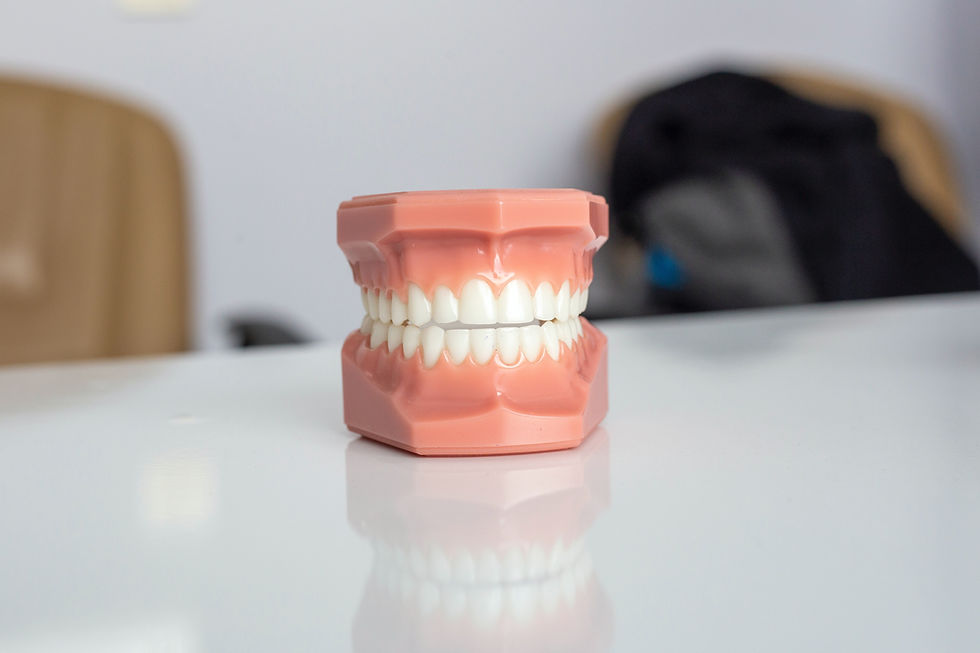5 Interesting Facts You Probably Didn't Know About Teeth Whitening
- JOYCE ONYEAGORO
- Apr 17, 2023
- 3 min read

Recently, more and more people have wished to have brighter teeth. With the craze of celebrities and fashion bloggers posting flawless grins on social media, the concept of beauty and perfection permeates our culture more. We all desire a beautiful smile with naturally white teeth.
People have developed a passion for having the ideal smile thanks to a rapid upsurge in whitening toothpaste, rinses, and over-the-counter teeth whitening kits. Meanwhile, teeth whitening is a fast and effective option for anyone who desires a more vibrant, assured smile. Professional teeth whitening can help in removing stains that develop naturally over time on teeth. As a result, you can get your smile back to its former glory without compromising your financial situation or oral health.
Here are ten quick facts on teeth whitening that most people are unaware of:
Teeth whitening is not harmful to your teeth.
It's a frequent myth that all teeth whitening products harm your teeth. Professional dental specialists are adequately trained to deliver whitening treatments safely and comfortably while adhering to rigorous criteria.
Store-bought whiteners may injure the oral cavity if individuals do not follow directions carefully. Also, wearing whitening strips for longer than suggested might cause significant tooth sensitivity and gum discomfort. Professional teeth whitening is extremely safe. Active chemicals are used in the whitening procedure to open pores in your teeth and remove stains temporarily. Your teeth naturally remineralize and rehydrate after each whitening treatment.
Sensitivity is entirely normal and expected after teeth whitening.
It is perfectly natural for sensitivity to occur during the whitening procedure. The teeth become momentarily dry, reducing their ability to protect the nerve from temperature variations. But as soon as the bleaching agent's impact wears off, the pores naturally relax, reducing your teeth' sensitivity.
Sensitivity will go away within 12-36 hours of whitening. Dentists and specialists prescribe a post-whitening fluoride treatment after whitening to replenish the teeth and encourage rehydration.
Teeth stains cannot be removed overnight.
There isn't a product on the market that can deliver immediate results. Any whitening agent cannot penetrate so quickly and deeply.
The whitening procedure can take anywhere from 4 days to several months. People with severe stains need to be patient and understand that each whitening session will eliminate years' worth of stains. It is effortless to maintain once the stains are removed.
Dental Crowns and Veneers cannot be whitened.
The conventional tooth whitening method is ineffective on artificial teeth like implants, dentures, caps, and veneers. They are made of materials such as porcelain and resin that prevent the whitening gel from being absorbed.
However, your porcelain crowns and veneers will likely continue to be the same color as when they were first put in. Veneers made of porcelain don't tarnish for a very long time. Dental work won't be damaged by teeth whitening.
Laser and UV tooth whitening only lasts a short time.
A frequency of light called ultraviolet (UV) light works by speeding up the action of the whitening gel. Only dentists are allowed to perform this procedure, which is FDA-regulated. Although it whitens teeth very quickly, individuals with sensitive teeth cannot use this method. In addition, the outcomes are transient and still require maintenance (often with custom-fitted whitening trays or repeat dental visits). The procedure takes a long time and is exceptionally pricey.
Keep these simple guidelines in mind for living a healthy lifestyle and adopting regular dental hygiene practices; you can feel good about yourself and have a celebrity smile without spending much money on bleaching kits.



Comments